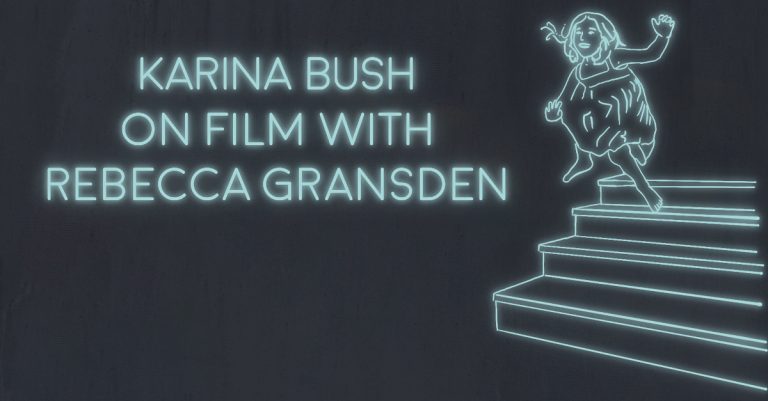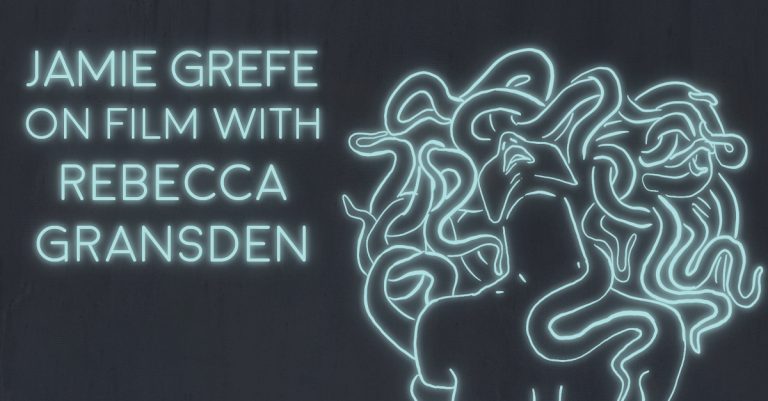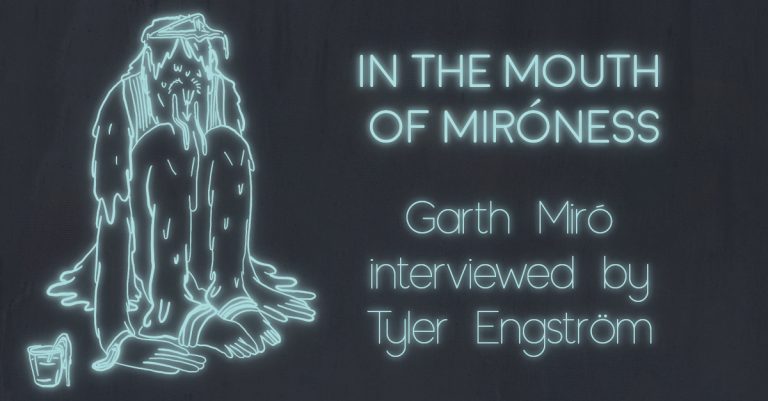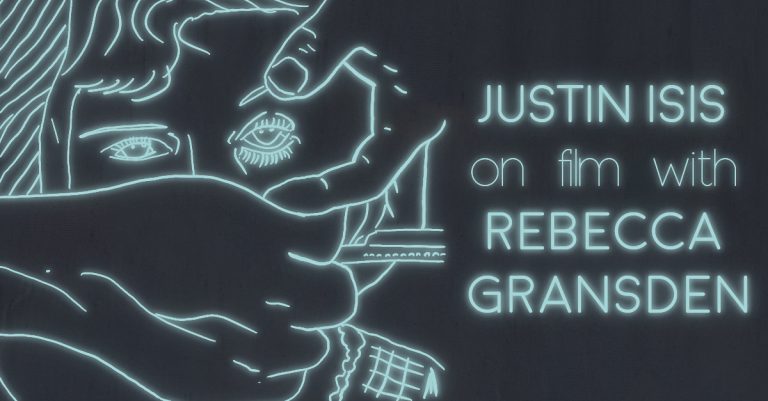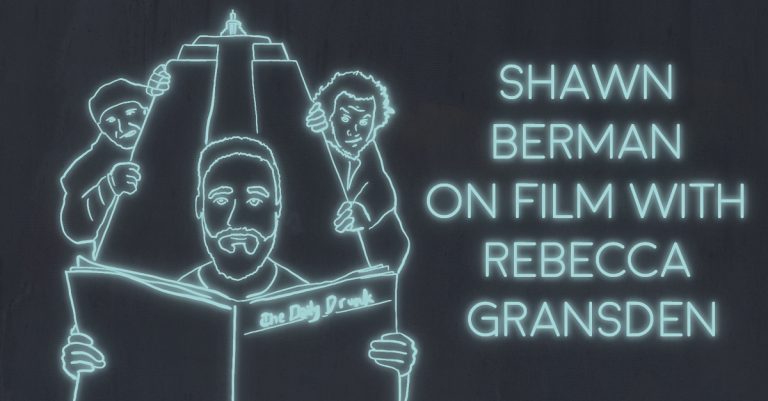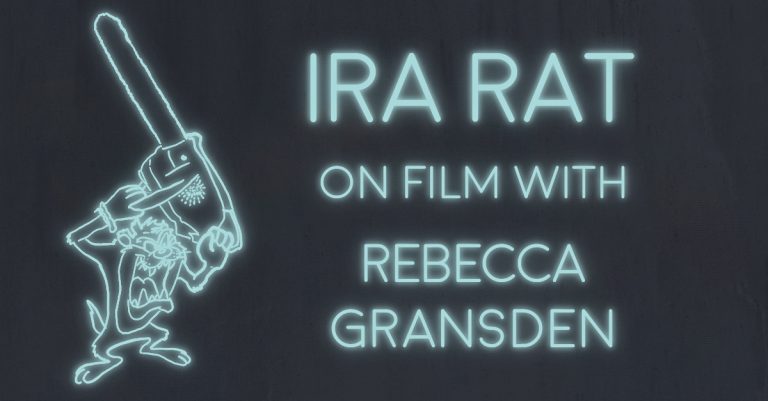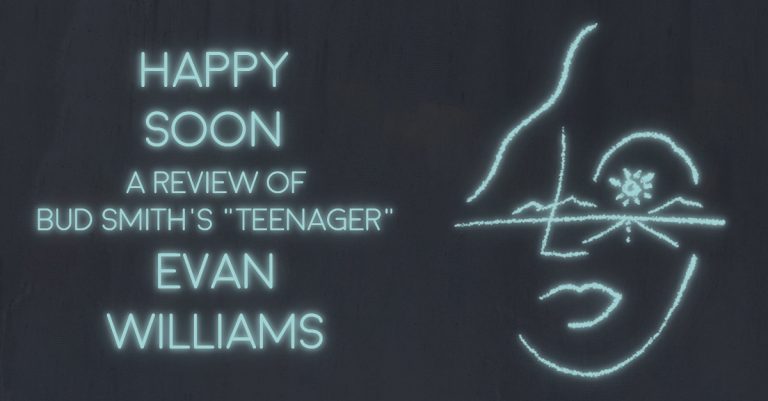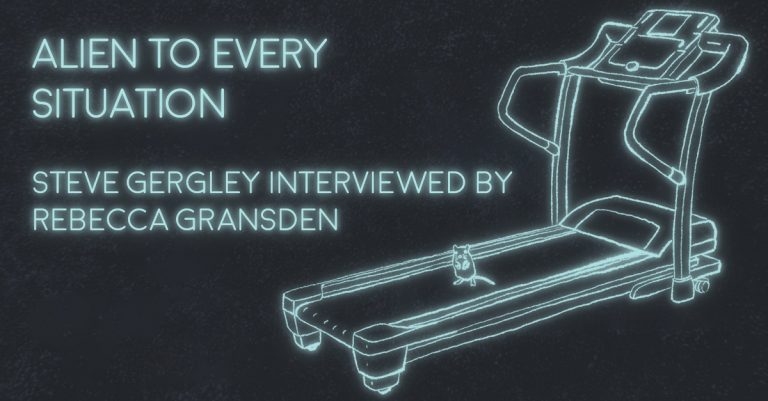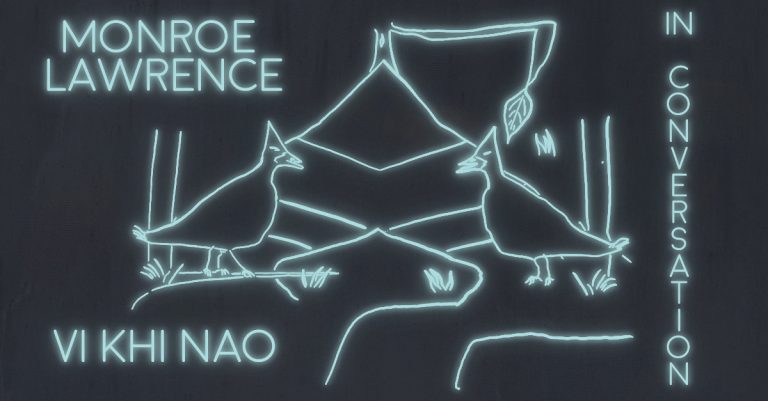
MONROE LAWRENCE IN CONVERSATION WITH VI KHI NAO
VI KHI NAO: Almond was mentioned quite a few times on page four of About to Be Young. Can you tell me about your relationship with this edible oval nutty thing? When I was in Spain, eating pistachio ice cream for lunch, dinner, and breakfast, the ice cream maker kept repeating “almond,” and “almond” over and over to imply the almond tree growing in the winter months a few hours from Granada. It reminded me of your poem that begins with “Oh God” and ends “crying almond, almond, almond into the night.” Will the poets in my life always have the proclivity to wail “almond” and “almond”—arresting me, seizing me in the geocentric moment with this almondness?MONROE LAWRENCE: Maybe they will: I uprooted “crying almond, almond, almond into the night” out of a pile of drafts of poems I was reading by my friend, a poet, who I mention in the acknowledgments. But I was intrigued by what it could do positioned in the right way: I wanted to celebrate the almond line, set it apart. I’ve never eaten pistachios, and am allergic to most nuts, though I am entranced by the colour of pistachio ice cream... lurking in its barrel... Incidentally, the almond line might carry a reference to Paul Celan, I’m remembering The Elephants editor Broc Rossell made a comment to that effect early on...VKN: Celan? How so? What is it like to work with Broc? He is not at all allergic to nuts. The first time I met him in person (was it AWP DC? Or AWP Los Angeles), he was eating lots of cashews? Almonds? Because his metabolism is so so so high. He is columnar, narrow, and fastigiate like those northern evergreen trees or those tall and skinny aspen trees with eyes. Did he consume your poems with an accelerated metabolism as he does with the nuts you are allergic to? And, how did he consume your poetry? What was the process like? And, since you are allergic to nuts, are you allergic to flowers too?ML: Not that I know of re: flower allergy. I’m definitely jealous of people that know the names of all the flowers. I imagine an allergy to certain flowers would make one liable to know their names. There’s this Allen Grossman poem “Sentinel Yellowwoods,” where the speaker goes on a walk in the woods after learning the Latin names of various plants and suddenly has this powerful experience of the natural world… yet it took a cataloguing of the names of the flora to enable that experience of wonder. I definitely relate to that. Broc was so kind and precise and fun. It was great to work with someone who lived for so long in Vancouver and moved through the same spaces I did. It’s also lovely to imagine one has been emailing with a columnar, fastigiate person. He was really generous to me with About to Be Young and helped me to learn about aspects of typography, design, etc. There is a Celan poem “Count the almonds”... in a lot of Celan’s poetry there is an investment of small, countable objects with a strangled lyrical intensity—as if a poet might call any noun into the night and have that named thing resonate. I like the idea, too, that the intonation rather than the denotative meaning receives emphasis in Celan. How does one manage the intonation on the page? Framing “almond” language on page 4 was one way of coding or curating intonation.VKN: I am also jealous of people who know the names of flowers, but also trees by heart. My friend, Joe Markovich, is such a person. He lives in Seattle and tells me all sort of things about Douglas fir, bald cypress, etc. Now that I know you are not allergic to flowers, how did you, Monroe, “edit the violets” yourself? And, what does that mean to you? ML: I have to say, to some Americans, that I am from just north of Seattle; my parents, just north of Seattle, are both such people capable of naming every tree. In Proust—violets, hawthorns—I just see a blurry, if beautiful, mass of colours and leaves.Like many of the poems in the book, “I / edit / the violets myself” was excavated out of a much longer poem. So maybe the poem refers to my journey to it. I had to endure weeks of carving other, semi-superfluous language away to let myself be okay with that being the poem. I think, too, the lines want to take responsibility for their shameful impingement on a like ineluctable beauty of the natural world. One way About to Be Young works to pry open embarrassment is by having language that isn’t just inspired by a place of shame or embarrassment or failure but is actually… aesthetically shameful. Actually has lines that are clunky, excessive, failures. So, I take responsibility for editing the violets.VKN: Why didn’t your parents name you after a tree? Is Monroe a tree? Where have you not been okay with something being the poem? ML: I acquired my name via the mountains of Scotland, called Munros… I think Scotland was a special place for my parents. I regret though that I was too ensconced in the sixth Harry Potter book when I visited Scotland in sixth grade to gaze in any way lingeringly upon the Munros.One thing I discovered writing About to Be Young and other poetry was I had to truly let go of what I wanted the poem to be. Sometimes I will write something that I feel sentimental about or that I think needs to stay a certain way and not be revised, but in such cases I generally accept that it may not be work that anyone is interested in. It took years of work to let go of intention in my writing process. I am against intention.VKN: Ah, Monroe, you are a mountain. There is a saying (maybe Vietnamese? maybe from my mother?) that it’s harder to move mountains than to change someone’s way of being/personality. You are tall and lanky yourself—can someone move you if they want to? I met you when you were at Brown. You came once to meet me at a three story Victorian home I was couchsurfing at. There you told me you had fallen deeply in love. It was a terrible year for me. The year you came in from that abrasive wind in that abrasive month. Did you miss Brown, Monroe? ML: I do miss Brown and the incredibly rich friendships I made there—the intensity of focusing on writing and process for two years straight. I feel moved all the time. I enjoyed our visit so much, and writing with you over tea. I’m sorry to hear that it was such a terrible year.VKN: What do you feel moved by? Wind? Instrument? Gender? I am sorry too. ML: All of the above. It’s windy, and cold in Pawtucket right now. Moving. I feel almost… no gender right now—moving. I feel the coffee and tofu I’m consuming, which are moving.VKN: The cover of your book reminds me of two pigeons trying to climb an Aztec pyramid. I discovered from my recent trip to Brown that your partner drew it. I know you have always wanted their work to be on the cover of your work. How did you decide on this particular drawing? And, that burnt red? Its color? It feels you—like a sweater I can imagine you donning. ML: One of the first things I officially “did” at Brown University was to introduce the poet Camille Dungy while wearing a burnt red sweater; I was sort of manically energetic and probably did a memorably poor job. But the rest of my time there the writer Colin Channer referred to me with a winning grin as “the guy in the red sweater.” So you’re not wrong.I went through a lot of my partner’s archives and sketchbooks trying to find a cover. I liked the combination of messiness and pattern—symmetry—in the image, two effects I think the poems also aim to bring together. The birds on the cover are mirrored, but one of them is clearly drawn hurriedly on a scanned piece of ruled 8.5x11 paper, that is sort of torn up, so it feels both like a draft that came together quickly and something possessing an alien, preordained plan. A lot of their art has this sprawling asymmetry. I see that as an interest we maybe share.VKN: I am curious—how did your morning unravel? Did you make coffee? Go to a coffee shop? Or did you haul an ax over your shoulder to chop down a tree? And, what is your favorite poem from this collection? I just flipped through your book and I saw the word “nephew-genital” out of context. It alarmed me a little. I did not expect a baby penis to make its way through your Canadian soul. Tell me more about Anna. Which poem is most-Anna? And, which one is least? ML: I blame “nephew-genital” entirely on the literary technique of assonance. This morning I made coffee and finished the Michi Saagiig Nishnaabeg writer Leanne Betasamosake Simpson’s novel Noopiming. I really loved it. It was weirdly reassuring to encounter, since it uses a form similar to the one in a novel I’ve been trying to write for ages and which I’ve sort of privately worried is too formally weird. The rest of the morning I worried about how I would appear in the interview we were doing later in the day.My favourite poem is maybe on page 7, “I want to play seriously on the roof,” if only because it’s the most grammatically normative and proves to inexperienced poetry readers that I’m not insane. Its shape and grammar are a tribute to J.H. Prynne’s poem “The Holy City,” whose lineation I copied and which seems written by an alien creature from another world. The Anna of About to Be Young is a character, maybe, even as the emotions that led me to write about them were genuine. Not a character but… distinct from the person I now know and love.VKN: How is it distinct? Also, does your novel have a title? How is it formally strange? ML: As I worked to write and revise the latter half of About to Be Young, its language led me away from the real experiences with Anna that inspired them to a place that was, perhaps, emotionally authentic but fictional in its particulars. I think that love poems can both celebrate and disfigure their object in this way. Well, they probably always disfigure it. So I’m eager to distinguish the name or letters A-n-n-a in the book from a person in the world.My novel’s called Remembrance Day, indexing a scene at the center of the narrative that happens at a Remembrance Day ceremony, a sort of Canadian “Veteran’s Day” at which one is meant to celebrate and—indeed—to remember the sacrifices made by soldiers in WWI and II. At six and seven years old I was totally transfixed by these ceremonies—the bagpipes are playing, there is a moment of silence, everyone solemnly gathers—and I used to just feel that that was how we were supposed to be behaving all the time. Life is so intense and emotional and only the pomp and ceremony of Remembrance Day really felt equal to it. At any rate, the scene also wants to interrogate the uncanny commonwealth whiteness displayed during the ceremony and to ask why the day is conducted the way it is—what it means for the communities that practice it.The form of Remembrance Day and About to Be Young are similar to Noopimig’s but Simpson develops it in her own incredible way. It was really incredible to read. Minimalism, emphasis on the page break—there is sometimes only a sentence or two on a page or a single paragraph, or two paragraphs. VKN: Last night I watched a film titled The Perfect Candidate directed by the first female Saudi Arabian filmmaker, Haifaa al-Mamsour. I loved the film and in the film there was a lovely lyric that the protagonist’s father sang over and over again when he was touring: “you caused me trouble and exhausted me”—a song about love. Have you experienced a love that is of such devastatingly romantic caliber? ML: In a book called Bitter Green, there is a line that helped me—well, to live—but also to write About to Be Young: “do not suppose that the things you feel most keenly are yourself.” I wanted to think about that, what do we prioritize in locating the self and ought we really to prioritize intensity of feeling. Maybe the self is banal. One of the things I like about lyric poetry is that it does seem to prioritize that intensity: that’s what lyric poetry… is. So About to Be Young asks, as so many books do, what relationship poems have to the full, robust self that is their speaker. “Devastating romantic love” is the perfect or maybe just clichéd subject for lyric poetry because it embraces excess and embraces the loss of self to feeling, or the identification of the self with intensity. Anna and I sometimes laugh at my plangent reconstruction of that “devastating” time but I’m glad the book is a record of it. Of “devastating romantic love”... !VKN: So many of your poems from this collection are so minimal and short, but they are so powerful and charged with intense emotionality and philosophical purity. Did they get short like so through the editing/eviscerating process? Or did they mostly arrive fully formed as sparse (though not meager) entities? ML: Almost none of the poems arrived fully-formed or smoothly or organically. Or easily. It was only when I began to delete and carve away and to stop caring about the initial impulse out of which they arose that the work really came alive. I was also young and… —about to be young, when I wrote them. I’d spent a long time writing ironic, knowing poems that shielded themselves cautiously against anticipated criticism and enemies I imagined populating the experimental poetry world. Finally, I gave up self-defense and wrote these craft-driven aesthetically polished poems that celebrated being an embarrassed and sentimental young person in semi-innovative form that my peers and professors were urging me to write.VKN: How old are you now, Monroe? The depth of your poems’ sentiment conceals itself in the line breaks and large blank spaces—when you divorce yourself so often (as many times over as you deem necessary)—does it impede your desire to get institutionally married? To line breaks? To vast empty spaces? Do you grow tired? Does hebetude ever find you? ML: I just turned 28—a time of deep hebetude, vast opportunity. My friends are generally and to some extent skeptical of marriage or endeavoring to imagine new forms of companionship. That endeavor sometimes involves a capitulation to normative structures or an acknowledgment of the like implacable and reifying power of social strictures. I did, however, “marry” two friends last year in Concord MA, which was really beautiful. So I have no coherent position on institutional marriage. But am definitely otherwise worried about what institutionality permits and prevents in art and poetry...VKN: Ah, 28. It’s a good age to exist. I am old now. And since I am so old, I misread one of your poems. You had written “Golden like a fad / of caring. A bowl of pottery.” I had chosen to read it as “A bowl of poetry.” If you did have a bowl of poetry in front of you, what would be swimming it it? Would you use a fork, spoon, chopstick to eat it? Or would you consume it with your fingers: raw, bare, barren hands? Are you a neat eater? Or are you voracious like a famished coyote? Would you wait until your nails grow long and windy and twisty to eat?ML: I have poor table manners, probably. I think I would like to eat a poem so sly and recklessly formed that I choke on it and almost die and only just survive to tell the tale.VKN: What is a good film & tea to co-consume with About to Be Young, do you think? ML: In 2016 I met a writer who studies the films of Robert Beavers and who introduced me to the films of Gregory Markopoulos. I traveled to Greece that year on a generous and very very enabling grant, and watched the most recently restored 12 hours of Gregory Markopoulos’s film Eniaios. (The full film is 80 hours.) The screening was held in a remote village in Arcadia: Sitting in a field and watching the entirely silent film that is composed mostly of black leader react against the night sky made it impossible to separate out the discrete art object—the film—from my own private experience of making the pilgrimage to see it. I think that is how all art works. Or else, that film really invites you to think about the impossibility of teasing apart the artwork from your self, history, position. I sense Beavers, Markopoulos’s partner, would be disturbed to find out—or has already been disturbed to find out—that a few of his own 16mm films are on YouTube. He and Markopoulos are super invested in site and setting and context when it comes to experiencing their work and usually you can only view their 16mm work at screenings. I saw Pitcher of Colored Light at the Whitney in New York City. I shouldn’t mention the digital versions, maybe. But, those Youtube videos have meant a lot to me; I recommend them, Beavers’ gentle twisting of the turret, the image blurring upward, with your favourite kind of tea.
Read More » 
